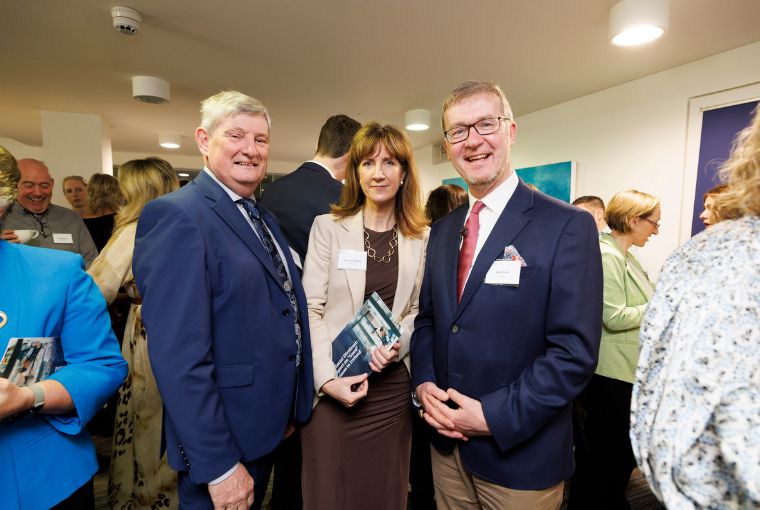In this thought leadership article, Alan Tyrrell CDir, Senior Managing Director, Teneo Ireland, discusses the view of business, the how of business and how challenges might be faced through the how of business.

(Pictured: Alan Tyrrell CDir, Senior Managing Director, Teneo Ireland.)
Through the lens of the C-suite the business of business is, first and foremost, business. But the ‘how’ of business rather than the ‘how much’ is a key item for leaders grappling with the macro challenges in economic, supply chain, consumer confidence, and talent retention.
Based on new research from advisory firm Teneo, in partnership with Business in the Community Ireland, Social Impact strategies are a key and deeply embedded component of the ‘how’ of business in Ireland. When done properly, social impact initiatives drive competitive advantage, build stakeholder trust, strengthen long-term business resilience and create value.
In the boardrooms of companies we spoke with across many industries, social impact is a regular agenda item, discussed alongside strategy, innovation, risk, governance and financial performance. Many leaders highlighted the interest among board members in being actively engaged in social impact work rather than simply hearing it be reported.
Speaking about the research, Tomás Sercovich, CEO of Business in the Community Ireland, said: Over the past 25 years, we have seen a clear evolution in the importance and role of social impact in business strategy. Today, social impact is aligned to business metrics and objectives that drive innovation while simultaneously addressing societal needs and expectations. Businesses that model this behaviour are much needed if we want to tackle societal inequalities and ensure no-one is left behind in the climate transition. Businesses are powerful agents of change, and this report shows the key success factors of social impact that make a difference for individual companies and wider society.
A framework for impact
Based on the research, we have developed a framework for social impact and measurement is a key item that comes in two waves. Firstly, there is calibration of social impact with business goals. The interviewees for our research made it clear that their companies demonstrate a strong commitment to measuring progress in real time with solid metrics. They establish clear, quantifiable key performance indicators on social impact – tracking volunteer hours, benchmarking employee engagement, monitoring community engagement and assessing the direct impact on the social issue being addressed.
Targets are fine to strive for, but the second strand of measurement is validation of the outcome. The leaders we spoke with are crystal clear that ongoing validation of the impact of their social strategy is vital. By leveraging data-driven insights, these companies continuously refine their approach amplifying both business and social impact.

(Pictured: Pat O'Doherty, C-Suite Coaching and Leadership Development, Non-Executive Chairman and Board Member; Caroline Spillane, CEO, Institue of Directors Ireland; and Alan Tyrrell, Senior Managing Director, Teneo Ireland at the Social Dividend Report Launch April 2025)
This level of oversight holds leaders accountable and, in many cases, ensures they have “skin in the game” by embedding social impact measures into executive scorecards, performance reviews and remuneration structures. Approximately 40% of respondents identified the CEO as the executive sponsor for social impact work, followed by the CPO at 24%. Notably, 14% of companies reported having no executive sponsor at all. Despite the perceptions that social impact is primarily a marketing function, only 2% of participants named the CMO as the executive sponsor. When it comes to alignment with corporate purpose, 49% said their social impact strategy is very closely aligned, while 40% reported it is somewhat closely aligned.
‘Good’ Communication
Communicating social impact can present challenges but our framework gives helpful guidance. Leaders who communicate with authenticity on social impact communicate it as a business outcome, not simply a ‘nice thing to do’. And they follow three key principles.
First, build stakeholder trust and ensure stakeholders – be it employees, customers, shareholders, or the wider community, know your rationale, focus and desired outcomes for both social impact and business impact. Second, work only on social impact programmes where you can deliver a clear impact but also ideally generating a distinct competitive edge. And finally, candidly share the real-world benefits of the initiatives you undertake, highlighting the positive effect, what you learned and your ongoing commitment. By deploying an honest and authentic narrative, businesses can dispel concerns of virtue signaling and instead reinforce a credible, long-term commitment to making a difference.
In today’s world of unprecedented change business leaders in Ireland are clear —social impact is a key component of strategy to address macro challenges, overcome market headwinds and create value. Far from being an afterthought, social impact is a source of innovation, opportunity, differentiation, cost reduction and business growth. It delivers a clear and measurable dividend for business and society.
- The Social Dividend report can be found on the Teneo website www.teneo.com or via the link here: Article on Teneo.com: http://bit.ly/3Eq8luj
- Direct link to PDF: https://bit.ly/4kapJ5x
Demonstrate your commitment to good corporate governance
Discover how to join our collective and become empowered, informed, and supported by a network of fellow pioneering directors.
